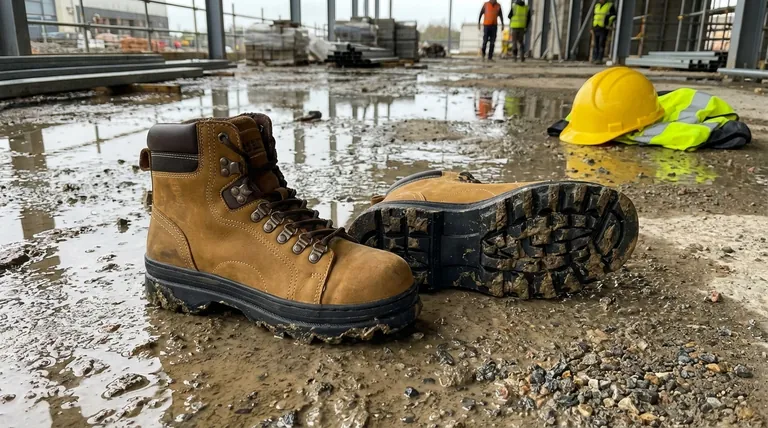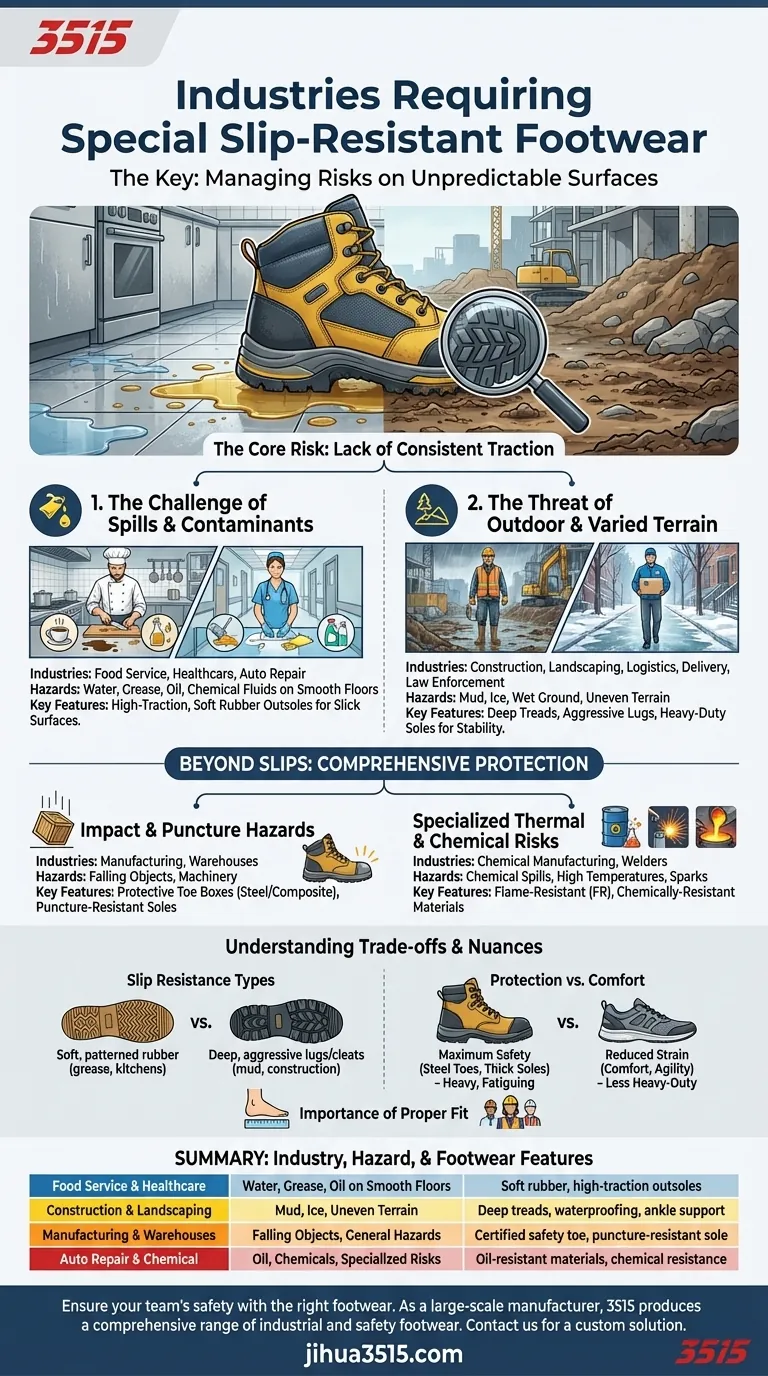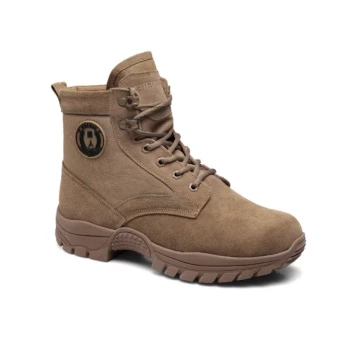In short, industries requiring special slip-resistant footwear are those where workers are frequently exposed to slippery, wet, or unpredictable surfaces. Key sectors include food service, healthcare, construction, and manufacturing, but the need extends to any role where slips, trips, and falls are a significant risk.
The specific industry is less important than the work environment itself. Any job that involves exposure to water, oil, grease, uneven terrain, or heavy objects demands a critical assessment of foot protection, starting with slip resistance.

The Core Risk: Unpredictable Surfaces
The fundamental need for slip-resistant footwear stems from one factor: a lack of consistent, reliable traction between a worker's shoe and the ground. This risk manifests in several common workplace environments.
The Challenge of Spills and Contaminants
Many industries constantly battle slippery floors due to liquid contaminants.
Food service and catering are prime examples, where spills of water, grease, and oil are a daily occurrence. Standard footwear offers little protection on these slick surfaces.
Similarly, healthcare professionals work in environments with frequent fluid spills, requiring footwear that maintains grip on smooth hospital flooring.
Auto repair shops present another major risk, with mechanics navigating concrete floors often slick with oil, coolant, and other automotive fluids.
The Threat of Outdoor and Varied Terrain
For many workers, the ground itself is the primary hazard.
Construction, landscaping, and logistics professionals work on surfaces that change with the weather, including mud, ice, and wet ground. They require footwear with heavy-duty soles and deep treads for stability.
Delivery drivers and law enforcement officers encounter a wide variety of unpredictable surfaces throughout their day, from wet pavement to icy sidewalks, making reliable traction essential.
Beyond Slips: The Need for Comprehensive Protection
For many industries, slip resistance is just the starting point. The environment often dictates the need for additional protective features to guard against a range of physical and chemical hazards.
Impact and Puncture Hazards
In environments with heavy materials, the risk of falling objects is constant.
Manufacturing, construction, and warehouses are settings where heavy objects or machinery can cause severe foot injuries. This necessitates protective toe boxes (like steel or composite toes) to guard against impact and compression.
Specialized Thermal and Chemical Risks
Some jobsites contain less obvious but equally dangerous threats.
Workers in chemical manufacturing may need footwear made from flame-resistant (FR) or chemically-resistant materials to protect against spills and potential combustion.
Welders also require specialized boots that can withstand high temperatures and protect from sparks and molten metal.
Understanding the Trade-offs and Nuances
Selecting the right footwear is not a one-size-fits-all solution. The features that excel in one environment may be unsuitable for another, creating critical trade-offs to consider.
Not All Slip Resistance is Equal
The term "slip-resistant" is broad. A shoe's effectiveness depends entirely on its outsole design.
A soft, patterned rubber sole is ideal for gripping a greasy kitchen floor. However, that same sole would be ineffective on a muddy construction site, which requires boots with deep, aggressive lugs or cleats to dig into the terrain.
Protection vs. Comfort and Agility
There is often a direct trade-off between the level of protection and all-day comfort.
Heavy-duty industrial boots with steel toes and thick soles offer maximum safety but can be heavy and fatiguing. Choosing footwear that provides the necessary protection without being overly cumbersome is crucial for reducing worker strain.
The Importance of Proper Fit
Protective features are useless if the footwear doesn't fit correctly. This is especially true as more diverse workforces enter industrial roles, highlighting the need for footwear designed to fit a wider range of anatomies.
Making the Right Choice for Your Environment
To select the appropriate footwear, you must analyze the specific hazards of the job, not just the industry title.
- If your primary risk is liquid spills on smooth floors (kitchens, hospitals): Focus on footwear with a high-traction, soft rubber outsole specifically rated for oily or wet surfaces.
- If your primary risk is outdoor terrain (construction, landscaping): Prioritize boots with deep treads, waterproofing, and strong ankle support.
- If your primary risk is falling objects (manufacturing, warehouses): Ensure your footwear has a certified safety toe and, if necessary, a puncture-resistant sole.
- If you face a mix of hazards (auto repair, general contracting): Look for a hybrid boot that combines certified slip resistance with a safety toe and oil-resistant materials.
Ultimately, the right footwear is a critical tool that ensures your safety and enhances your ability to perform your job effectively.
Summary Table:
| Industry | Primary Slip Hazard | Key Footwear Features |
|---|---|---|
| Food Service & Healthcare | Water, grease, oil on smooth floors | Soft rubber, high-traction outsoles |
| Construction & Landscaping | Mud, ice, uneven terrain | Deep treads, waterproofing, ankle support |
| Manufacturing & Warehouses | Falling objects, general hazards | Certified safety toe, puncture-resistant sole |
| Auto Repair & Chemical | Oil, chemicals, specialized risks | Oil-resistant materials, chemical resistance |
Ensure your team's safety with the right footwear. As a large-scale manufacturer, 3515 produces a comprehensive range of industrial and safety footwear for distributors, brand owners, and bulk clients. We can provide your workforce with shoes and boots that combine certified slip resistance, protective toe caps, and all-day comfort, tailored to your specific industry hazards. Contact our experts today for a consultation and get a custom solution to reduce workplace accidents.
Visual Guide

Related Products
- Custom Wholesale Leather Safety Boots Direct Factory Manufacturing
- Wholesale Safety Footwear Manufacturer for Bulk & Custom OEM Orders
- Customizable Anti-Smash Safety Boots for Wholesale & Private Label Manufacturing
- Premium Grain Leather Safety Boots for Bulk Supply
- Premium Wholesale Waterproof Safety Boots High Performance Protection for Industrial Markets
People Also Ask
- What factors differentiate anti-slip shoes from each other? Find the Right Fit for Your Work Environment
- Can regular shoes be made slip-resistant? The Truth About Temporary Fixes vs. Engineered Safety
- How do specialized traction patterns in non-slip shoes work? The Science of Water Displacement
- What shoes are good for working on feet all day? Find Supportive Footwear for Maximum Comfort
- What are non-slip shoes? Essential Safety Footwear for High-Risk Workplaces
- Why is outsole design important for non-slip shoes? Unlock the Key to Ultimate Slip Resistance
- How can ice grips improve shoe traction on icy surfaces? Prevent slips with mechanical grip.
- What are the three key design features that make shoes slip-resistant? Master the Science of Grip



















